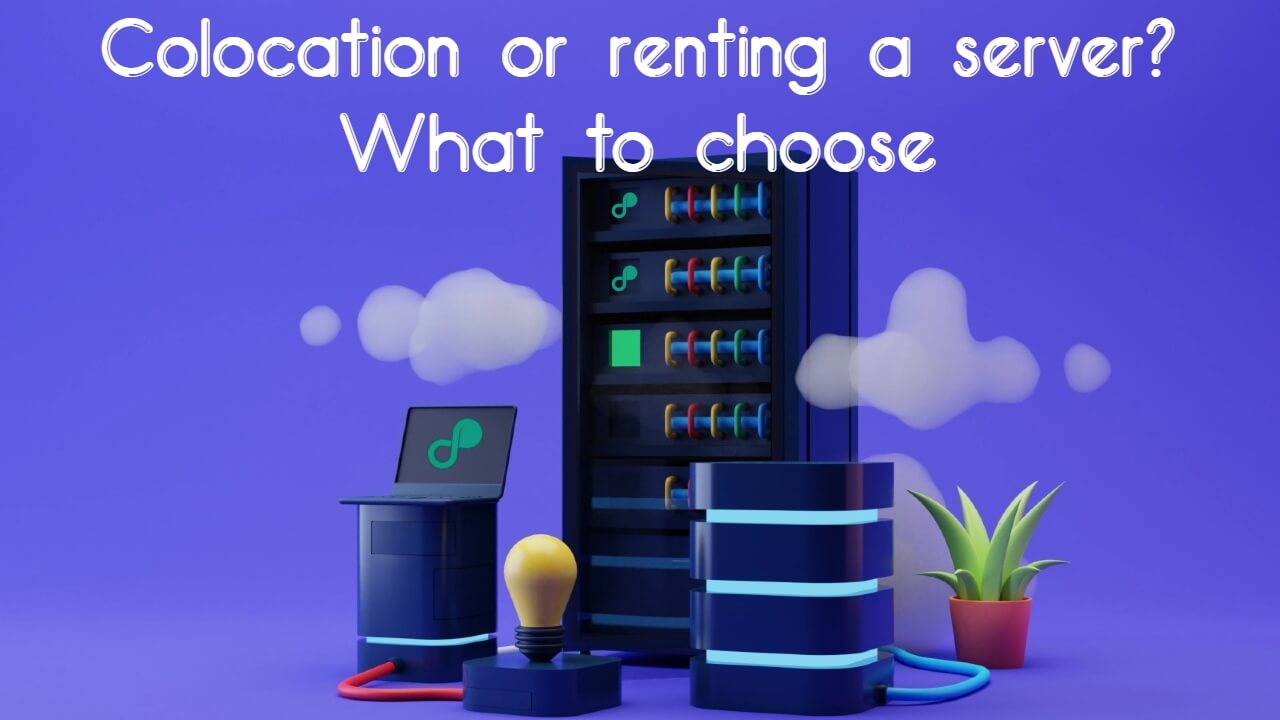12 Jun

When it comes to web hosting and managing servers, businesses often struggle to decide between colocation services and renting a server. Each option has its advantages, disadvantages, things to consider, and the choice depends on what the business needs. In this article, we will look at the main differences between colocation and renting a server, and discuss the pros and cons of each, so you can make a well-informed decision.
Choosing a colocated server is a unique way to manage your website hosting and you take on the responsibility of purchasing your hardware. While it may require a higher initial investment, it offers greater control and customization opportunities.
Colocation is a suitable choice if you want to actively address the technical aspects of your project and have full autonomy over your hosting environment.
When it comes to colocation, you only need to pay for the data center racks and the necessary maintenance. This means there is not a wide variety of pre-configured plans available. However, the pricing is flexible since you can select different rack configurations based on your hardware requirements and project preferences.
Keep in mind that you will need an employee who can directly visit the data center and handle the necessary configurations. Alternatively, you can check with your colocation provider if they offer their team's services for this purpose.
Although there is a higher upfront investment involved, colocation can be a more advantageous option, especially for long-term projects. The fees cover only the server racks, providing transparency and potential cost savings in comparison to other hosting alternatives.
Another option for hosting your business website is to rent a server. If you choose to rent a server, you'll rent it from a server from a hosting provider. The hosting provider takes care of the server hardware, and you simply pay a regular fee to utilize its resources. Renting a server is a convenient choice for businesses that don't own their hardware or prefer not to invest in the upfront expenses of buying and managing equipment. Renting a server means that the quality of your hardware will depend on the hosting provider. It can be advantageous if the hosting provider is reliable, but it can be a downside if they are not.
Additionally, renting a server offers a higher level of flexibility since you are not limited to the specific hardware you own. You don't need to buy additional hardware if your requirements grow, nor do you need to dispose of old hardware if you want to upgrade or no longer need it. By renting a server, you inherently can easily scale your resources as needed.
Pros of colocation server hosting
Colocation server hosting offers several advantages that businesses should consider when deciding on their hosting solution. Let's explore some of these advantages in more detail:
- Choose your hardware: With colocation server hosting, you have the freedom to choose your hardware. This is particularly beneficial for companies that have specific infrastructure requirements, whether it's for new applications or legacy systems. By having control over your server components, you can ensure that your hardware aligns perfectly with your needs, providing optimal performance and reliability.
- Own your hardware: Another advantage of colocation server hosting is that you own your infrastructure. Unlike renting through a dedicated server hosting plan, where you never actually own the hardware, colocation allows you to have full ownership. You can either lease to own or purchase the equipment outright, eliminating the ongoing cost of renting and giving you complete control over your hardware.
- Control your cost: Colocation also enables you to have greater control over your costs. When you opt for traditional hosting, you are paying for various services, including server maintenance and maintenance which are included in the hosting package. However, with colocation, you take on the responsibility of maintaining your servers, which can result in cost savings over time.
Cons of colocation server hosting
While colocation server hosting offers several advantages, it's important to consider the potential disadvantages as well. Let's take a look at a couple of key challenges associated with colocation:
- Manage your hardware: One disadvantage of colocation server hosting is that you are responsible for managing your hardware. In the event of a hardware failure, you or someone from your team will need to physically travel to the data center to address the issue. While fixing hardware components may not be a significant cost, it can require unexpected travel and time investment. Additionally, you may need to keep spare components on hand to quickly address any failures, which can increase your overhead expenses.
- Manage your software: With dedicated server colocation, you also bear the responsibility of managing the software. This typically involves performing remote software updates and patches promptly. If you lack an in-house development team, ensuring that your operating system and associated software are up to date may require additional resources or outsourcing, resulting in extra costs.
Advantages of Renting a Server
- No capital investment: One of the major benefits of server rental is that you don't have to make an initial investment in purchasing server hardware. This can be beneficial for businesses that don't have much money or those who want a hosting option that can be easily changed in the short term.
- Customized services: Rental servers often come with a range of services designed to cater to the needs of smaller or temporary projects. These services can include data backups, security measures, and technical support, providing convenience and peace of mind.
- Quick provisioning and scalability: Renting a server allows for rapid provisioning, meaning you can quickly get your website or application up and running without delay. Additionally, rental servers offer scalability, enabling you to easily adjust your server resources as your project's demands change over time.
- Managed infrastructure: When you rent a server, you benefit from a fully configured and managed server. This includes the necessary infrastructure, such as network connectivity and power supply, as well as ongoing support from the hosting provider. This relieves you of the burden of hardware maintenance and technical management.
Disadvantages of Renting a Server
- Limited customization and control: Renting a server may provide less flexibility in terms of hardware customization compared to colocation. Since you don't own the physical server, you may have restrictions on modifying hardware components or specific configurations to match your exact requirements.
- Dependence on hosting provider: The quality of hardware and overall performance of your rented server relies on the hosting provider. It's crucial to choose a reputable and reliable provider to ensure reliable server performance and avoid potential issues that could impact your website or application.
- Long-term cost considerations: While server rental can be a cost-effective option for short-term or smaller projects, it may become more expensive in the long run compared to colocation. Monthly or yearly rental fees can accumulate over time, potentially surpassing the costs associated with purchasing and maintaining your own hardware in a colocation setup.
When faced with the decision between colocation hosting and renting a server, there are important factors to consider. Let's explore these considerations to help you make an informed choice.
Which One to select?
Colocation server hosting may be the right option if:
- You want to have a long-term savings: If you have the financial means to invest in purchasing hardware upfront, colocation can be a cost-effective solution in the long run. By owning your infrastructure, you can avoid ongoing rental fees associated with dedicated server hosting.
- You need technical expertise: Colocation requires you to have a team with the necessary skills to handle hardware failures and software issues. If you already have an experienced team or can hire one, colocation can provide you with the level of control and customization you desire.
- Maintenance responsibilities: With colocation, you'll need to be prepared for the responsibility of maintaining your infrastructure. This includes traveling to the data center when necessary and ensuring you have spare components available to address hardware failures.
Renting a server may be a better choice for you if:
- You don't want to spend money upfront on purchasing server hardware: By renting a server, you can avoid the initial cost of buying hardware, which is particularly beneficial for businesses with limited financial resources or those who want to minimize their upfront investment.
- You need the flexibility to scale your resources according to your changing needs: Renting a server allows you to easily adjust your server capacity, whether you need to increase or decrease it. This scalability feature provides you with the flexibility to adapt to your business requirements without the hassle of managing and upgrading hardware on your own.
- You prefer a fully managed solution: When you rent a server, the hosting provider typically offers comprehensive management and support services. They take care of tasks such as server maintenance, security, backups, and updates, freeing up your time and resources to focus on other important aspects of your business.
- You want access to professional technical support: Renting a server often grants you access to expert technical support from the hosting provider. Their knowledgeable team can assist you with troubleshooting, resolving technical issues, and optimizing server performance, ensuring that your server operates smoothly.
- Quick deployment and resource provisioning is essential: Renting a server allows for rapid deployment and provisioning of resources. This means that you can swiftly launch your website or application without the delays associated with purchasing and setting up your own hardware.
- You have short-term hosting requirements: If you have projects or businesses with short-term hosting needs, renting a server is a suitable option. It provides the flexibility to adjust your hosting solution as required, without any long-term commitments or obligations.
.png)













Jay Pala